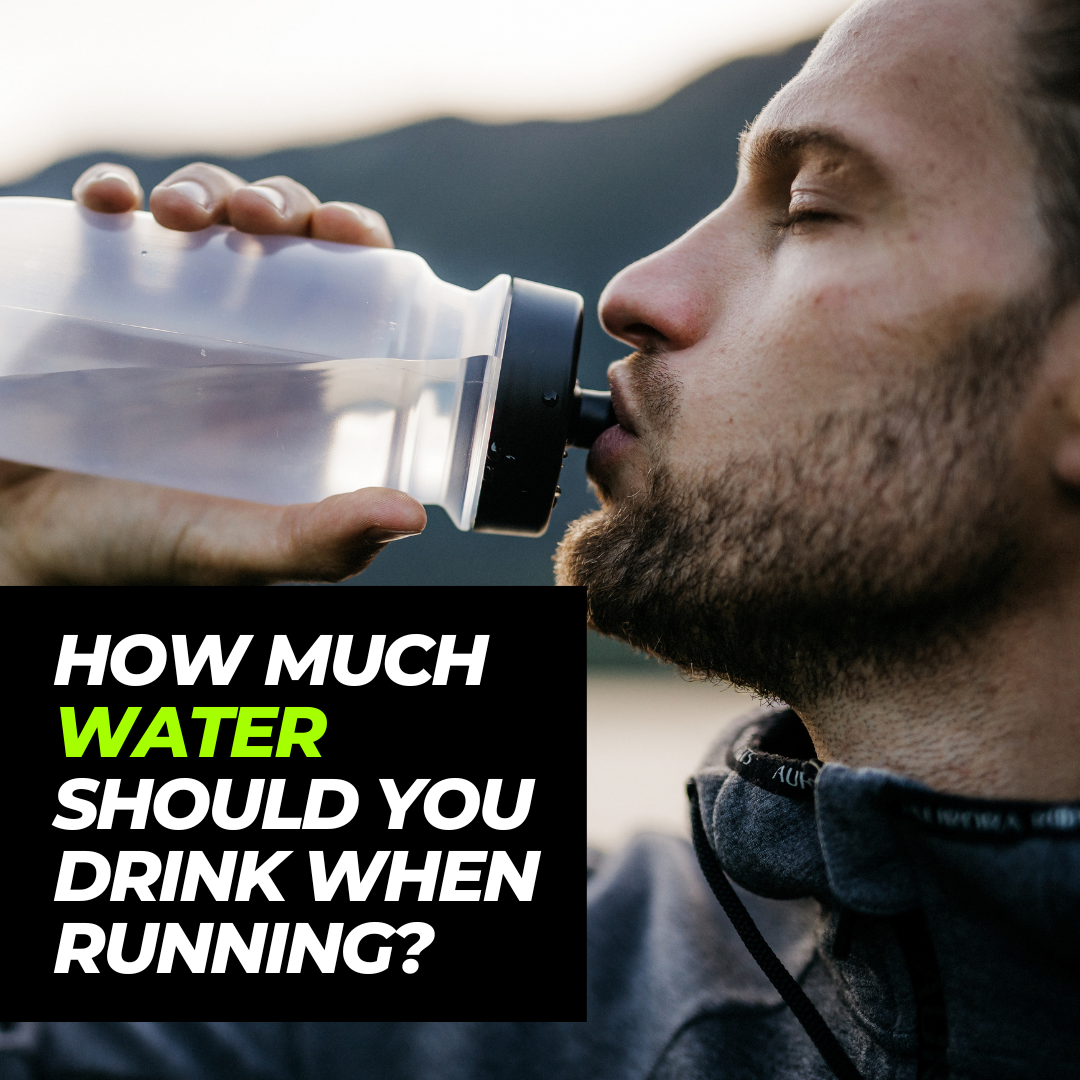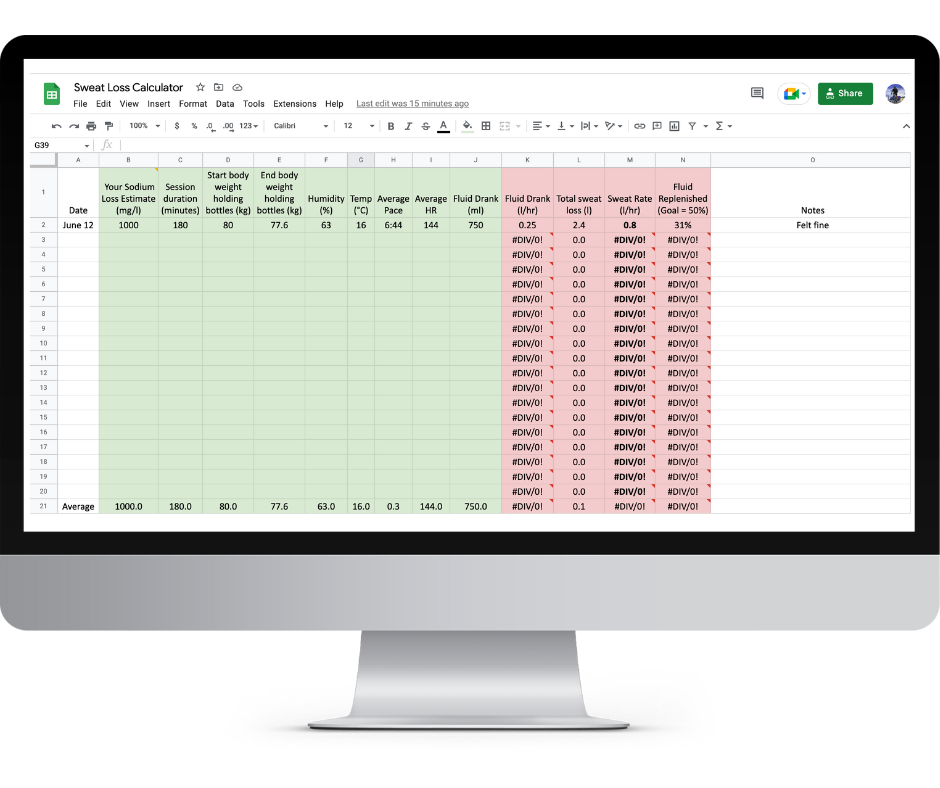Subscribe to The Adaptive Zone Podcast…
If you want to know how much water you should drink when running, you’ll need to know how much you sweat. Sweat rates vary from runner to runner. Some people sweat as little as 200ml of fluid per hour, whereas others can sweat as much as 3 litres per hour!
To make things more complicated, sweat rates can vary significantly within the same runner. If you’re running in -30°C you will sweat far less than you will in +30°C. You will also sweat far more when you’re running at race pace than you will at your easy pace.
As you can see, trying to give generic advice on how much water you should drink when running is a fools errand. So what we really need is a strategy to work out how much water you need. To work that out, we need to get a picture of how much fluid you lose when you’re running.

Sweat Rate Test
All we need here is a bathroom scale. Before your run, stand on the scale holding whatever drinks you’re taking with you on the run. If you have a bottles or a hydration pack, hold/wear them while you’re on the scale.
Set the scale to metric. Now, hold on there my American friends. Before you navigate away from this page, there is a good reason to set the scale to kilograms, just bear with me. Step on the scale, holding your drink bottles and write down what it says in kg.
Now, go for your run. When you return, towel off the sweat from your body, remove your shirt and get back on the scale holding your empty bottles. Write down what it says in kg.
Here are the numbers from one of my runs:
Weight before = 80kg
Weight after = 77.6kg
So I lost 2.4kg during that run. That’s 2.4 litres of fluid (I told you there was a good reason to use kilograms!).
Now I want to know my sweat rate per hour. This run was 2 hours long. So my sweat rate is 1.2 litres per hour.
Sweat Rate = 2L per hour
This is a good start. I know that I sweat (roughly) 1 litre per hour. However, we know that my sweat rate will vary depending on the conditions and how hard I run. So I need to repeat this test regularly in different conditions and at different running intensities.
To make the whole thing easier, there’s a handy little spreadsheet at the bottom of this article. But before we get to that, we have to talk about electrolytes.
Do I need Electrolytes for my Run?
You lose a bunch of different electrolytes when you run but the only one that you need to worry about is sodium. Sodium (Na) is an electrolyte that makes up part of salt (NaCl). We lose quite a bit of sodium in our sweat, that’s why it tastes salty.
Depending on how long and hard you run, you might need to replace some of the sodium you lose. The question is, how much? Well, just like water, it really depends on you.
Sodium losses can vary wildly from runner to runner. Ranging from 200mg per litre all the way to over 2000mg per litre! So, if you’re wondering if you need electrolytes for your run, you’ll need to work out how much sodium you are losing.
How Salty is my Sweat?
The gold standard here would be to get a sweat test. Precision Fuel & Hydration provide sweat tests in many locations. However, if there are no testing locations near you, you’ll have to estimate.
I recently interviewed the founder of Precision Fuel & Hydration, Andy Blow, on the Adaptive Zone Podcast. I asked Andy how we could estimate our sodium loss without having a sweat test. The following video jumps straight to his answer…
Andy has an excellent article on his website that outlines 5 questions to determine if you’re a salty sweater.
- Does your sweat taste salty and/or sting your eyes?
- Do you feel faint or suffer head rushes when standing up quickly after exercise?
- Do you suffer from muscle cramp during/after long periods of sweating?
- Do you often feel terrible after exercising in the heat?
- Do you crave salty foods during or after exercise?
Based on your answers to these questions, you can estimate the saltiness of your sweat.
- High Saltiness – you answered yes to four or five of the above questions
- Moderate Saltiness – you answered yes to two or three of the above questions
- Low Saltiness – you answered yes to one or two of the above questions
The average athlete loses ~ 1000mg of sodium per litre in their sweat. We can use this figure to place runners into one of three categories.
- High Saltiness: 1500mg Sodium per litre
- Moderate Saltiness: 1000mg Sodium per litre
- Low Saltiness: 500mg Sodium per litre
I answer yes to 3 of the 5 questions, so I would estimate that my sweat is moderately salty, Meaning my sodium loses are moderate and roughly 1000mg/L of sweat.
Sodium Loss = Moderate (1000mg/L)
By now you should understand how work out these two things:
- How much fluid do you lose per hour? (see Sweat Rate Test above)
- How much sodium do you lose per litre? (1500, 1000 or 500 mg per litre)
How much should I Drink when Running?
Now you know roughly how much fluid and sodium you are losing. So the question becomes…how much fluid should you replace?
Well, that is a question without a definitive answer. It’s a hotly debated topic in the sports science world, so my recommendation on this may change. For now, I’m going to lean on Andy’s advice. He suggests that we start off by replacing about 50% of our fluid losses when running and then work from there.
In the example I gave above, we measured my fluid loses at around 1.2 litres per hour. Looking at Andy’s 5 questions, I would estimate that my sweat is moderately salty. Meaning my sodium loses are going to be around 1000mg per litre.
Sweat Rate = 1.2 L/hour
Sodium Loss = Moderate (1000mg/L)
If I want to replace 50% of the fluid I’m losing, then I need to drink 600ml per hour and use electrolyte tablets that have 1000mg of sodium per litre. Simple.
So that’s my hydration strategy. I buy electrolyte tablets with 1000mg per litre and drink about 600ml per hour. You can follow the same process to get a starting point for your hydration strategy.
Experiment
Andy goes to great length to emphasize that calculating how much you should drink when running is not a prescriptive process. Using the method above will give you a good starting point. Then you have to see how you feel. I started working on this last year and found that 400-500ml per hour worked well for me. I tolerate the 1000mg/L electrolyte tablets just fine.
You may find that way too much fluid, or way too little. Just try it out, see how you feel, and then adjust accordingly. If you feel like fluid is sloshing around in your gut and you have no desire to drink, then try a lower amount. This will help you figure out how much you need to drink when running.
If you still feel terrible exercising in the heat, try a little more. You can apply the same experimental process to the sodium concentration.
The Spreadsheet
The most important part of this process is to recognize that you need to take an individualized approach. Gather quite a bit of information about how much you sweat and how you feel. Test in different conditions and at different intensities.
On their website, Precision Fuel and Hydration have provided a helpful article and spreadsheet that goes through the process above. I used their spreadsheet for most of last summer and made some small modifications. This video shows you how to use it:
Download your own Sweat Loss Calculator Spreadsheet

In Summary
The amount of water a runner needs to drink when running depends on their individual sweat rate. To determine your sweat rate, use a bathroom scale to weigh yourself before and after a run. Subtract the difference to find the amount of fluid lost. This tells you your sweat rate per hour.
The level of sodium in your sweat can also be estimated by answering 5 questions related to your experience with sweating while running (see above). Based on these results, you can determine if you have a high, moderate, or low saltiness sweat.
With these two pieces of information, you can plan your hydration strategy for your next run.
Chapters
- 00:00 Introduction
- 01:33 How do I do a sweat rate test?
- 03:46 Do I need electrolytes for my run?
- 07:07 How do I know how much fluid to replace on a run?
More from Matthew Boyd Physio
- Free Online Course: Running Fundamentals
- Subscribe to The Adaptive Zone Podcast
- Subscribe to The Adaptive Zone YouTube Channel
- Facebook @matthewboydphysio
- Instagram @matthewboydphysio